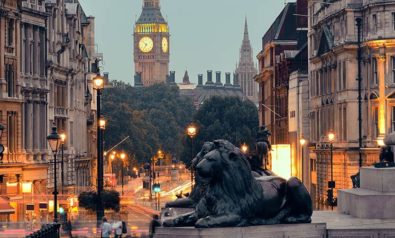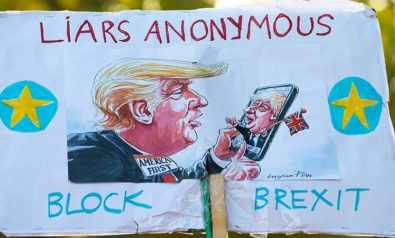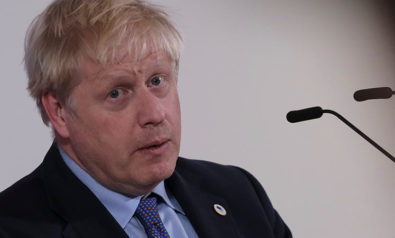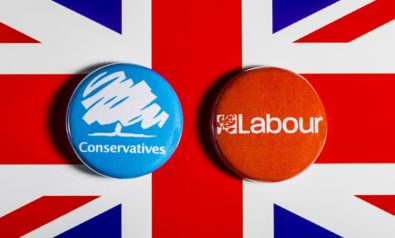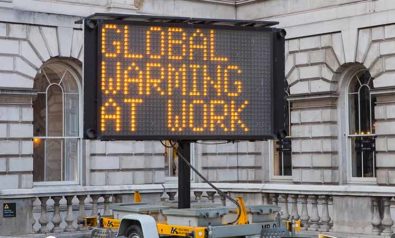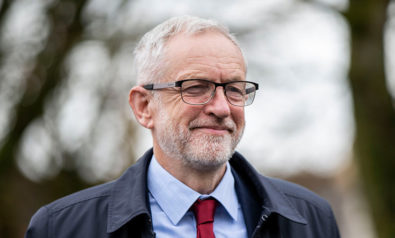Elections are almost invariably termed historic. For once, the use of the term is not an exaggeration. When British voters go to the polls on December 12, they will indeed be making a historic choice.
Scroll down to read more in this 360° series
British democracy has been dysfunctional since the 2016 Brexit referendum to leave the European Union. This is the second early election in three years. This is precisely what British MPs sought to avoid through the Fixed-Term Parliaments Act 2011. That legislation set a five-year period between general elections. Prior to 2011, a sitting prime minister could call an election at any point during his or her premiership. Now, that power lies with the House of Commons, and it has voted for an early election after much drama over the last two years.
The Story of the 2019 Election
In 2017, Parliament voted for an early election. Theresa May, the then-prime minister, wanted to secure a clear majority in Parliament for Brexit negotiations with the EU. May’s Conservative Party won 42.4% of the vote, its highest share since 1983. Yet it was not just Tories that got a high percentage of the vote. The Labour Party won 40%, its largest share since 2001. Labour might not have returned to power but, led by Jeremy Corbyn, it surprised pollsters and analysts, gaining 30 seats.
With a hung Parliament and no clear majority for either party, May was forced to seek the support of the Democratic Unionist Party (DUP), founded by the late Protestant preacher Ian Paisley in Northern Ireland, to continue as prime minister. In late 2018, a weakened May agreed a Brexit withdrawal agreement with the EU, but the House of Commons rejected her deal thrice. Consequently, in May 2019, she announced that she was stepping down as prime minister.
May’s resignation set off a leadership election in the Conservative Party. Its 160,000 members voted for Boris Johnson, the former mayor of London and the leader of the “leave” campaign during the Brexit referendum. Taking over as prime minister on July 24, Johnson promised to “deliver Brexit, unite the country and defeat Jeremy Corbyn.”
Johnson’s brief premiership has been eventful. He declared that he would “rather be dead in a ditch” than stay on in the EU after October 31, the deadline to depart from the union. Even his younger brother resigned from the cabinet. The prime minister repeatedly promised to take the UK out of the EU “deal or no deal,” but the House of Commons foiled his plans by prohibiting a no-deal Brexit. This was thanks to the rebellion of 21 Tory MPs who voted against the government, the first of Johnson’s 12 parliamentary defeats.
In September, Johnson suspended Parliament. However, the Supreme Court unanimously ruled against his decision. In an 11-0 verdict, the justices held that the prime minister had “acted unlawfully in shutting down the sovereign body” in the British Constitution.
Despite numerous setbacks at home, Johnson agreed a new Brexit deal with the EU on October 17. A majority of British MPs backed this withdrawal agreement but rejected Johnson’s plan to get it through Parliament in three days, leaving it “in limbo.” The prime minister sought a way out of this impasse by forcing an early election on December 12, the first UK general election in this month since 1923.
Why Does the UK Election Matter?
The election is historic because different parties are offering radically different visions for the UK’s future. This does not happen each time the country goes to the polls. In the 1950s, the Labour and Conservative parties moved to a broad consensus on economic policy. In fact, The Economist coined the term “Butskellism” because Conservative Rab Butler and Labour Hugh Gaitskell were indistinguishable in policy terms when they were chancellor of the Exchequer.
In 1997, Tony Blair’s New Labour wrested power from John Major’s Conservatives. However, there was not much daylight between the policies of the two parties. Similarly, there was little to separate David Cameron’s victorious Tories from the vanquished New Labour in 2010. Britain’s adversarial politics and tradition of feisty debate often magnifies policy differences but hides the common ground and shared beliefs on which its parliamentary politics generally operates.
Yet there are elections when seismic shifts occur. In 1945, Clement Attlee led the Labour Party to a historic victory. His government created the modern British welfare state with its fabled National Health Service (NHS). Attlee also presided over the decolonization of much of the British Empire.
In 1979, Margaret Thatcher’s election brought Butskellism to an end. Inspired by Austrian economist Friedrich von Hayek, the “Iron Lady” championed free markets and rolled back the role of the state. Thatcher privatized most nationalized industries, lowered taxes and encouraged homeownership. Her “Big Bang” reforms deregulated financial markets and made the City of London a rival to Wall Street.
The election on December 12 is similar to the elections of 1945 and 1979. This was clearly in evidence on December 6 when Johnson and Corbyn squared off in a televised debate. They jousted over the future of the NHS, the UK-US relationship and, of course, Britain’s ties with the EU. Corbyn promised democratic, Scandinavian-style socialism and Johnson promised “one-nation conservatism” in which “a dynamic market economy” would “pay for fantastic public services.”
Unlike 1945 and 1979, though, the December 12 election might not just be a two-horse race. Smaller parties may punch above their weight. The Liberal Democrats were in a coalition government with the Conservatives from 2010 to 2015. Now, they are attracting attention again because they have vowed to overturn the Brexit referendum and remain in the EU. The party plans to replace rates for small businesses with a new land-value tax on landlords. It aims to boost entrepreneurship as well and redevelop town centers and high streets. This might be music to the ears of some voters.
In 2019, regional parties are more important than ever with the Scottish National Party (SNP) reported to be on the ascendant. In 2016, Scotland voted against Brexit. In 2014, the Scots voted to stay in the UK but, at that time, the UK was a part of the EU. It is possible that an SNP victory might put Scottish independence back on the agenda and give the party a say in the formation of the future government in Westminster.
The DUP, which has supported the Conservative government since 2017, hopes to have “significant influence” after the election. It supports Brexit but opposes Johnson’s withdrawal deal. Its Catholic rival, Sinn Féin, bitterly opposes Brexit. In 2017, the Northern Ireland Executive collapsed because of differences between Sinn Féin and the DUP. Since then, the situation has deteriorated and the Royal College of Nursing has plans to start strike action for the first time in its 103-year existence. Both parties of Northern Ireland are important in this election.
Finally, Nigel Farage’s Brexit Party cannot be underestimated. In November, Farage decided not to contest the 317 seats the Conservatives won in 2017. Over the years, he has been the single biggest proponent of Brexit. Like the DUP, Farage’s party opposes Johnson’s Brexit deal. Some of his party members disagree. These Brexiteers are supporting the Conservatives instead because they are unwilling to risk Brexit. Furthermore, Farage’s party has appeal among the working class and could potentially take away votes from Labour, queering the pitch for the Conservatives.
Rarely have so many variables been at play when the British have queued up to cast their votes. This election will define an era.
The views expressed in this article are the author’s own and do not necessarily reflect Fair Observer’s editorial policy.
For more than 10 years, Fair Observer has been free, fair and independent. No billionaire owns us, no advertisers control us. We are a reader-supported nonprofit. Unlike many other publications, we keep our content free for readers regardless of where they live or whether they can afford to pay. We have no paywalls and no ads.
In the post-truth era of fake news, echo chambers and filter bubbles, we publish a plurality of perspectives from around the world. Anyone can publish with us, but everyone goes through a rigorous editorial process. So, you get fact-checked, well-reasoned content instead of noise.
We publish 2,500+ voices from 90+ countries. We also conduct education and training programs on subjects ranging from digital media and journalism to writing and critical thinking. This doesn’t come cheap. Servers, editors, trainers and web developers cost money.
Please consider supporting us on a regular basis as a recurring donor or a sustaining member.
Support Fair Observer
We rely on your support for our independence, diversity and quality.
Will you support FO’s journalism?
We rely on your support for our independence, diversity and quality.


